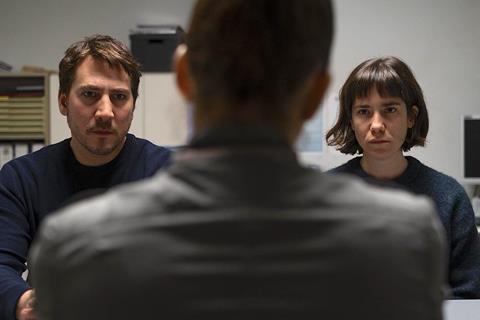‘Very clever film-making’: would-be immigrants are locked in a room by US border guards in this claustrophobic debut from Spain

Dir/scr: Alejandro Rojas, Juan Sebastian Vasquez. Spain. 2023. 74mins
An airport-set interrogation drama that exploits minimum resources to maximum dramatic effect, Upon Entry merges edge-of-seat suspense with political critique as a couple of would-be immigrants are cross-examined by US border staff to within an inch of their psychological stability. Superb performances, micro-controlled editing and an unrelentingly claustrophobic atmosphere are the hallmarks of Spaniards Alejandro Rojas’ and Juan Sebastian Vasquez’ debut, which amplifies universal airport anxieties into a whole movie.
The film plays out in that grey zone where legitimate questioning ends and the state torture manual begins
Upon Entry arrives in Malaga mid-way through a festival run that also includes SXSW, and its early scenes efficiently create the universal relatability that is so key to its effect. Spanish dancer Elena (Bruna Cusi, from Carla Simon’s Summer 1993) and boyfriend, urban planner Diego (Alberto Ammann, from Cell 211 and Narcos) are headed for a new life in Miami via New York. Diego worries that he has left his passport at home: by the end, he’s probably wishing he had. A beautifully-shot three-minute document check sequence wrings every possible drop of stress out of that common exchange, and paves the way for the tensions ahead.
Things ramp up with the couple being taken to the chillingly-named “Secondary Inspection Office” and the arrival of Agent Vasquez (Dominican actor Laura Gomez, from Orange Is The New Black), who is, ironically, as Latina as Diego and Elena. (This notion introduces a further note of complexity to the power games on display, but the script just lets it hang.)
Agent Vasquez’s constant probings and repetitions, cajolings and warnings, perfectly timed to generate maximum disturbance, soon frustrate Elena, who swears in Spanish, forgetting that Agent Vasquez also speaks the language. For a while, the interrogation continues in Spanish. But Diego has been just a little too edgy and anxious about things from the start. Unlike Elena, who clearly feels innocent until proven guilty, his reactions are more muted and cautious. Unsettlingly, the viewer starts to wonder whether things might not be as they seem.
What’s clear is that this is not just good guys against bad guys – though when the second interrogator, weaselly Agent Barrett (Ben Temple, an American actor resident in Spain) arrives to turn up the heat still further, he’s unquestionably a bad guy. Now, the questions will become outright interrogation as Temple and Vasques, the couple holding the cards, probe deeply into the backstories of the increasingly desperate couple opposite them: disconcertingly, the cops seem to enjoy their job a little too much.
Upon Entry could serve as a guide to the smilingly aggressive techniques sometimes used by security staff, calculated to heighten interviewee vulnerability – micro-controlling the rhythms of the exchanges, for example, and steadfastly refusing to reveal what all these questions are actually for. In the early scenes of Upon Entry, our identification with Elena and Diego – which will be massively complicated by later events – means that as their palms grow sweatier, so do ours. All sorts of fascinating issues are raised, about whether immigration can ever be a crime, the psychopathy of the state and more, but none of them are addressed directly, the focus remaining tightly squeezing tension from the increasingly anguished exchanges.
Psychologically, the film plays out in that grey zone where legitimate questioning ends and the state torture manual begins. We’ve all been asked, in a brisk, professional manner, whether we have packed our bags ourselves; we have not all been asked, in the same impersonal tone, whether we love our partner, as Agent Vasquez asks Elena. Essentially, this super-calibrated script is stretching that authorised violation of the intimate – which we wouldn’t accept from a stranger in the street, but which we accept in the name of airport security – to film length. To this extent, Upon Entry has shades of Craig Zobel’s 2012 punchy and memorable Compliance.
Both Ammann and Cusi are very plausible, each painfully slowly falling apart in different ways, often in tight close-up. In retrospect, doubts could be raised about whether at least some of the information that emerges during the interrogation wouldn’t have been dealt with previously by the couple. Yet, during the film, we’re right in there, with them, locked into that small office for the duration, and – though this might sound like faint praise – we’re relieved when it’s all over. To generate so much drama from what is basically 74 minutes of people talking across a table at one another is very clever film making indeed.
Production companies: Zabriskie Films, Basque Films, Sygnatia
International sales: Charades leonard@charades.eu
Producers: Carles Torras, Carlos Juarez, Xose Zapata, Sergio Adria, Alba Sotorra
Cinematography: Juan Sebastian Vasquez
Production design: Zelso de García
Editing: Emanuele Tiziani
Main cast: Alberto Ammann, Bruna Cusi, Ben Temple, Laura Gomez
























